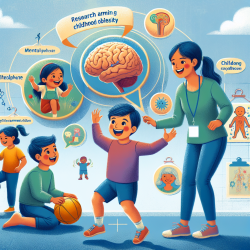As practitioners dedicated to improving the lives of children through speech therapy, it is essential to stay updated with the latest research and incorporate evidence-based practices into our methodologies. A recent study titled "Treating social cognition impairment with the online therapy ’SoCoBo’: A randomized controlled trial including traumatic brain injury patients" provides compelling insights that can enhance our approach to treating social cognition impairments, particularly in patients with traumatic brain injury (TBI).
The study evaluated the effectiveness of the SoCoBo online therapy, a fully computerized intervention targeting deficits in social cognition among TBI patients. Conducted as a randomized controlled trial (RCT), the research involved 64 TBI patients who were divided into two groups: one receiving the SoCoBo therapy and the other using a commercially available cognitive rehabilitation program, RehaCom®.
Key Findings
- Significant Improvement in Facial Emotion Recognition: Patients who underwent SoCoBo therapy showed notable improvements in their ability to recognize facial emotions compared to the control group. This finding underscores the efficacy of SoCoBo in enhancing this crucial aspect of social cognition.
- Increased Empathy: The SoCoBo group also demonstrated significant gains in self-rated empathy, a key component of social cognition that affects social interactions and overall life satisfaction.
- No Improvement in General Cognition: Contrary to expectations, the control group did not show significant improvements in general cognitive functions such as attention, memory, and executive functions. This highlights the specific benefits of SoCoBo in social cognition rather than general cognitive abilities.
Implications for Practitioners
These findings suggest that incorporating SoCoBo into therapeutic practices can yield significant benefits in treating social cognition impairments among TBI patients. Here are some actionable steps practitioners can take:
- Integrate SoCoBo into Treatment Plans: Given its demonstrated efficacy, SoCoBo can be a valuable addition to your therapeutic toolkit, particularly for patients struggling with facial emotion recognition and empathy.
- Focus on Social Cognition: While general cognitive improvements are important, targeted interventions like SoCoBo that address specific social cognition deficits can lead to more meaningful outcomes for patients.
- Monitor and Evaluate: Regularly assess the progress of patients using SoCoBo to ensure the therapy is meeting their individual needs and adjust the treatment plan as necessary.
Encouraging Further Research
While the SoCoBo study provides valuable insights, it also highlights the need for further research to explore the long-term effects and potential generalization of the therapy to everyday life. Practitioners are encouraged to contribute to this growing body of knowledge by conducting follow-up studies and sharing their findings with the broader community.
To read the original research paper, please follow this link: Treating social cognition impairment with the online therapy ’SoCoBo’: A randomized controlled trial including traumatic brain injury patients.










